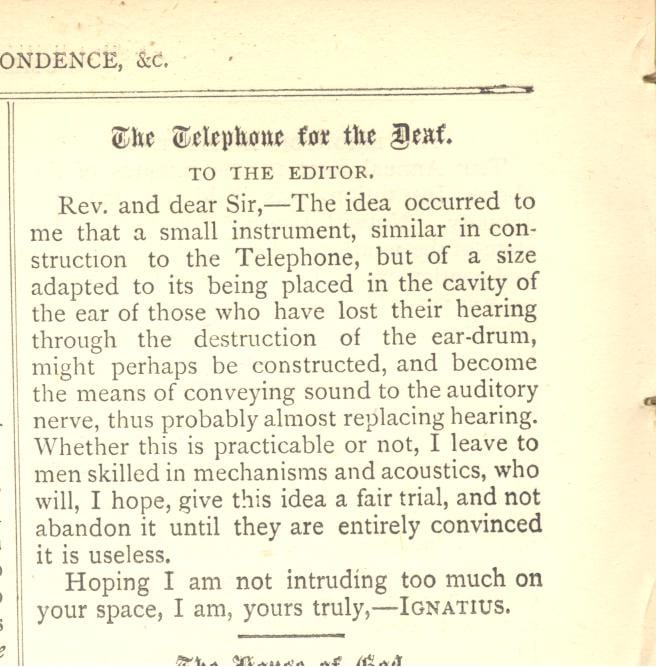The Hughes Microphone, and a ‘Telephone for the Deaf’
By H Dominic W Stiles, on 3 May 2013
Two slightly connected items today. Clerk Maxwell was the person who first suggested the possibililty of radio waves in 1867. Although Hertz gets the credit for establishing that high frequency electric currents did produce radio waves, and exhibited the properties of light waves but at longer frequencies, it was a Welsh-American, David Edward Hughes, who had first stumbled on the evidence (Geddes 1979). The devices Hughes experimented with in 1879 acted as a radio transmitter – his induction balance – and detector – the microphone he developed and for which he seems to have coined the term (John 1979). He declined to take out a patent on the microphone, saying it belonged “more to the realm of discovery than invention” (John).
Geddes (British Journal of Audiology 1979, sup 2.p.13-16) examines the place of Hughes in the history of radio. Hughes demonstrated his experiments to members of the Royal Society on 20th February 1880, but the were dismissed by Professor Stokes and Thomas Huxley.
Mr Spottiswoode, President of the Royal Society, Professor Stokes and Prof Huxley, visited me today at half past three p.m. and remained until quarter to 6 p.m., in order to witness my experiments withe Extra Current Thermopile, etc. The experiments were quite successful, and at first they were astonished at the results, but at 5 p.m. Prof Stokes commenced maintaining that the results were not due to conduction but to induction, and that results were then not so remarkable, as he could imagine rapid changes of electric tension by induction. Although I showed several experiments which pointed conclusively to its being conduction, he would not listen, but rather pooh-poohed all the results from that moment. This unpleasant discussion was then kept up by him, the others following suit, until they hardly paid any attention to the experiments, even to the one working through gaspipe in Portland Street to Langham Place on roof. They did not sincerely compliment meat the end on results, seeming all to be very much displeased because I would not give at once my Thermopile to the Royal Society so that others could make their results. I told them that when Prof Hughes made an instrument of research, it was for Prof Hughes’s researches and no one else. They left very coldly and with none of the enthusiasm with which they commenced the experiments. I am sorry at these results of so much labour but cannot help it. (Geddes, from Hughes’s notebooks)
Stokes suggested Hughes submit a paper on the experiments but Hughes did not, and he did very little more work on this according to Geddes. Despite this seeming failure to convince his peers (Stokes was Lucasian Professor at Cambridge), he was elected to the Royal Society in 1880, winning their gold medal in 1885 and becoming vice-president of the Society in 1891.
In 1876 Bell had developed the first telephone. It was not long before it was considered for its possibilities as a hearing aid. The first patent with this in mind was #226, 902 issued to Francis Clarke and Macomb G. Foster in 1880, but this was essentially a bone conduction device and does not merit classification as an electrical hearing aid according to Kenneth Berger (1984). Berger examines the various claims for early electric hearing aids (Berger, chapter 2), but it was not until 1901-2 that Miller Reese Hutchinson patented the first true wearable hearing aid.
J.E.J. John says, “The carbon microphone has changed since Hughes’ time but the microphone which we use everyday in our telephones is essentially Hughes'” (John, 1979).
I wonder if this reference from a letter to A Magazine Intended Chiefly for the Deaf and Dumb (No.63 Vol.6, March 1878), its one of the earliest references to a ‘hearing aid’? ‘Ignatius’ should have patented the idea!
Berger, Kenneth Walter, The hearing aid : its operation and development, 1984
Geddes, W.K.E., Hughes’ Place in the History of Radio, British Journal of Audiology 1979, sup 2. p.13-16
John, J.E.J., David Edward Hughes F.R.S. British Journal of Audiology 1979, Vol.13 sup 2 .p.5-10
One Response to “The Hughes Microphone, and a ‘Telephone for the Deaf’”
- 1
 Close
Close



[…] of the latter was David Edward Hughes who was a pioneer of the microphone (which we covered in a previous blog). Hughes, a great experimenter, developed his ‘audiometer’ at around the same time (1879), […]